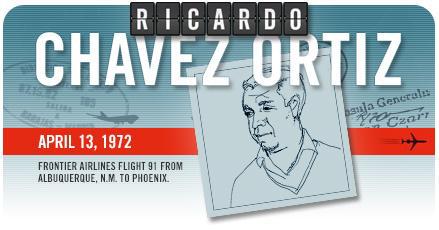In the late 1960s and early 1970s, the United States suffered through a skyjacking epidemic that has now been largely forgotten. In his new book, The Skies Belong to Us: Love and Terror in the Golden Age of Hijacking, Brendan I. Koerner tells the story of the chaotic age when jets were routinely commandeered by the desperate and disillusioned. In the run-up to his book’s publication on June 18, Koerner has been writing a daily series of skyjacker profiles. Slate is running the final dozen of these “Skyjacker of the Day” entries.
Name: Ricardo Chavez Ortiz
Date: April 13, 1972
Flight Info: Frontier Airlines Flight 91 from Albuquerque, N.M. to Phoenix.
The Story: The American public couldn’t help but sympathize with a few skyjackers whose personal narratives were unusually compelling—the ex-Green Beret who yearned to assassinate Fidel Castro, for example, or the troubled 18-year-old who had been sexually abused by her father. The era’s most widely beloved skyjacker, though, was 36-year-old Ricardo Chavez Ortiz, a Mexican immigrant and father of four. He tugged at heartstrings not only because of the hardships he had faced, but also because his sole demand was so modest: a fleeting chance for his voice to be heard.
In early April 1972, Chavez Ortiz left his family in Los Angeles to seek kitchen work in Albuquerque. But after just 36 hours in New Mexico, he made a radical decision: After 19 years of living hand-to-mouth, he was finished with the United States. He made a hasty plan return to his native Mexico, to become a cop in Tijuana.
Chavez Ortiz spent virtually all his remaining cash on two items: a plane ticket to Phoenix and a .22-caliber pistol. He planned to take the bus from Phoenix to Tijuana, then sell the gun on the black market at a $50 profit. After a few months on the police force in Tijuana, he would send for his eldest son, who was on the verge of joining an East Los Angeles gang.
But as Frontier Airlines Flight 91 made its way west, Chavez Ortiz had another change of heart: He placed his unloaded .22-caliber pistol on his lap and told the stewardess that he would like to speak with the pilot.
Upon entering the cockpit, Chavez Ortiz assured the flight crew that he had no interest in ransom. He asked only that the Boeing 737 fly past Phoenix and land in Los Angeles, where he would gladly release all the hostages on one condition: that reporters from the city’s Spanish-language media be brought on board to hear his statement regarding the indignities he had suffered in the U.S. “I don’t want to hurt no one, please,” Chavez Ortiz told the pilot in his imperfect English. “This is for save my sons and your sons, too. I am trying to save America, to save the whole world, because we are all crazy.”
True to his word, Chavez Ortiz let the passengers disembark at Los Angeles International Airport, keeping only the flight’s four crew members. A pack of journalists came on board, including audio engineers from a pair of local radio stations that wanted to air the hijacker’s statement live. Chavez Ortiz’s rambling 34-minute speech, which he delivered while wearing a pilot’s hat, covered a number of grievances: police brutality (“I am afraid that at any moment a policeman will take out his pistol and shoot me”), racism (“We are Mexicans; we live with the cockroaches”), and education policy (“The children that I have, go and ask yourselves, they have attended school for many years and they know absolutely nothing”). Once he had spoken his piece, Chavez Ortiz politely handed his unloaded gun to the pilot while apologizing for the day’s inconvenience.
The Upshot: Chavez Ortiz became an instant hero of the nascent Chicano movement. A defense committee formed to gather donations to pay for his $35,000 bail; dozens of families volunteered to put up their homes as collateral. Within a week of his capture, Chavez Ortiz emerged from the Los Angeles County Jail to the cheers of supporters gathered outside. But despite his popularity, Chavez Ortiz was convicted of air piracy and sentenced to life in prison, a term later reduced to 20 years on appeal
